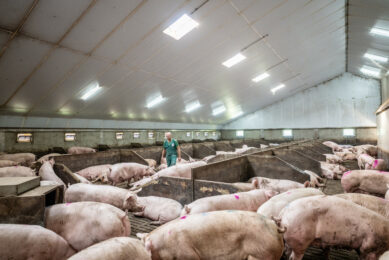Heat treatment improves piglet growth and health status

Recent research indicated that using gelatinisation during cereal product production for piglets results in a rapid reduction in viscosity and optimal nutrient intake in the small intestine. All these positive effects lead to faster growth and a better health status for the piglets.
The trials were carried out by cereal and animal nutrition company Meneba, headquartered in Rotterdam, the Netherlands. The company had research conducted into an intensive heat treatment, used during the production of its puffed cereal product range Presco.
Starch utilisation
The company writes: “For better starch utilisation, the starch needs to be mechanically or thermally gelatinised. The thermal treatment also affects the viscosity of the mass in the stomach and the intestine and therefore nutrient intake.
“For thermal gelatinisation of starch in cereals, Meneba has developed the Presco process. This process has positive benefits over other techniques such as steam flaking, micronising, expanding and extruding. In vitro tests, performed at the independent research centre Schothorst Feed Research, clearly showed these positive benefits.”
Process
The Presco process produces starch gelatinisation. Cereals are treated under high pressure (20-25 bar) with overheated steam for 15 to 30 seconds. By suddenly reducing the pressure, the grains expand rapidly and destroy the crystal structure of the starch entirely.
Both ileal digestibility and faecal digestibility of the starch and organic matter were proven to be better than other gelatinisation techniques, in in vitro-tests at the independent research centre Schothorst Feed Research, the Netherlands.
Viscosity
Because of their high degree of gelatinisation, the products Presco maize and Presco wheat remain in the stomach for longer. This enables the piglet’s protein-splitting enzymes to digest the protein in the feed more effectively. This results in higher ileal amino acid digestion.
Related websites:
Schothorst Feed Research
Schothorst Feed Research











